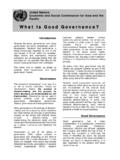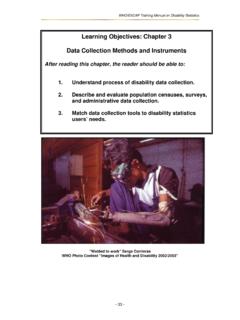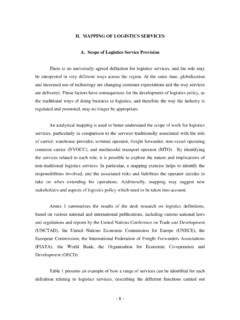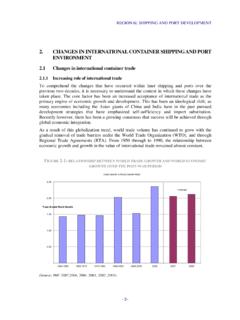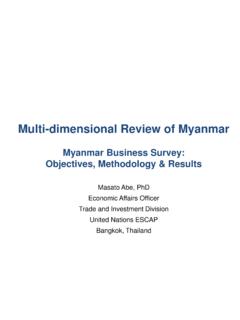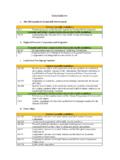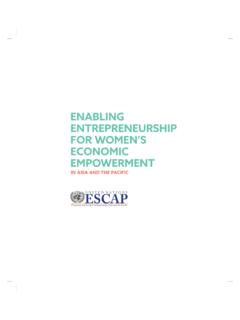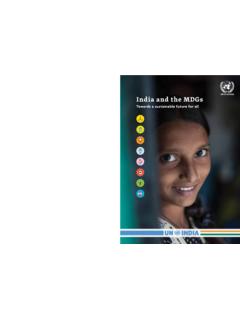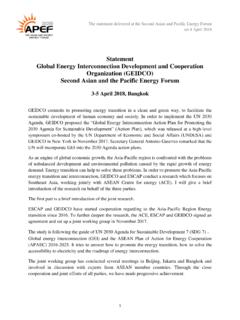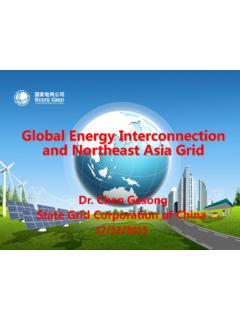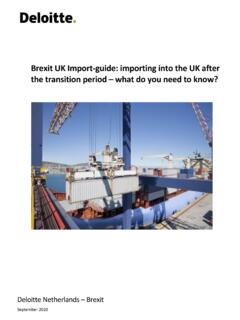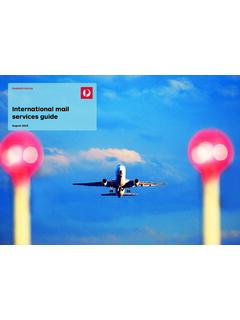Transcription of Sustainable Development Benefits of Integrated Waste ...
1 Integrated Resource Recovery CentersSustainable DevelopmentBenefits of IntegratedWaste ManagementUnited Nations publicationCopyright United Nations 2017 All rights reservedPrinted in ThailandST/ESCAP/2809 Cover design and layout by Jeff WilliamsThis publication was prepared under the project Pro-poor and Sustainable Solid Waste Management in Secondary Cities and Small Towns in Asia Pacific, which ESCAP initiated in partnership with Waste Concern and with funding from the Bill and Melinda Gates designations employed and the presentation of the material in this publication do not imply expression of any opinion whatsoever on the part of the Secretariat of the United Nations concerning the legal status of any country, territory, city or area, or its authorities, or concerning the delimitation of its frontiers or boundaries. The content and views expressed in this publication are those of the authors and do not necessarily reflect the views or policies or carry the endorsement of the United Nations.
2 Reference to a commercial entity or product in this publication does not imply endorsement. Trademark names and symbols are used in an editorial fashion with no intention of infringement of trademark or copyright laws. The publishing organization does not guarantee the accuracy of the data included in this publication and accepts no responsibility for any consequence of their publication may be reproduced in whole or in part and in any form for educational or non-profit services without special permission from the copyright holder, provided acknowledgement of the source is made. ESCAP would appreciate receiving a copy of any publication that uses this publication as a publication is also available online publication was printed with vegetable-based oil ink on green series paper made of100 per cent ecofibre. Integrated Resource Recovery CentersSustainable DevelopmentBenefits of IntegratedWaste ManagementAcknowledgements ESCAP, with technical support from Waste Concern, has assisted local governments in member States to establish and operate Integrated Resource Recovery Centers (IRRCs).
3 ESCAP established IRRCs in 2007, one in Quy Nhon City in Viet Nam and another in Matale City in Sri Lanka. From 2009, ESCAP enhanced the regional implementation of IRRCs under its project on Pro-poor and Sustainable Solid Waste Management in Secondary Cities and Small Towns in Asia-Pacific which was funded by Bill and Melinda Gates Foundation. Through this project, ESCAP has provided financial support and technical capacity building assistance for the IRRC implementation in seven cities, and advised the local governments on policies and regulations to support Sustainable municipal solid Waste publication shares the key lessons from a decade of IRRC implementation to improve municipal solid Waste management, and explains how the contributions of IRRCs can support the implementation of important global and regional agendas for Sustainable Development : the 2030 Agenda for Sustainable Development ; the New Urban Agenda; the Paris Agreement under the United Nations Framework Convention on Climate Change; the Regional Road Map for the 2030 Agenda in the Asia-Pacific region; and the Ministerial Declaration on Environment and Development in the Asia-Pacific region.
4 The publication also provides policy recommendations for promoting Sustainable municipal solid Waste management in secondary cities and small towns in the Asia-Pacific publication was prepared under the overall guidance of Stefanos Fotiou, Director, Environment and Development Division (EDD) and Curt Garrigan, Chief, Sustainable Urban Development Section (SUDS), EDD. The publication team was directed by Ram Tiwaree, Economic Affairs Officer, SUDS, EDD. The team includes Rahul Teku Vaswani, Batu Krishna Uprety, Jong II Chyun, Sam Johnson, and Alejandra Quevedo. ESCAP acknowledges the technical inputs of Waste Concern, and that of its project implementation partners in its member States. Last but not least, ESCAP expresses its profound gratitude to Bill and Melinda Gates Foundation for the generous funding to the project. Without the Foundation s support, preparation of this publication would have been not 2017 Contents Executive Summary6I.
5 Waste Management Challenges in Secondary Cities and Small Towns inAsia-Pacific7II. The Integrated Resource Recovery Centers Approach to SustainableUrban Waste Management111. The IRRC Model112. suitability of an IRRC for Secondary Cities and Small Towns in Developing IRRC: Modular, Scalable, and Replicable143. Key aspects of Implementing an IRRC184. Other important dimensions of IRRC Implementation215. IRRC provides a range of Sustainable Development benefits22 III. The Contributions of IRRCs towards the Implementation of the Global Agendas for Sustainable Development241. The 2030 Agenda for Sustainable Development242. New Urban Agenda273. Paris Climate Agreement and Nationally Determined Contributions294. Ministerial Declaration on Environment and Development inAsia and the Pacific30IV. Policy recommendations to implement decentralized solid Waste solutions321. Integrate decentralized urban Waste management solutions into local,sub-national and national policies332.
6 Improve Waste segregation collection, recovery, and final disposal using3R principles343. Ensure inclusive planning and implementation, and participatory assessment of the social, economic, and environmental impacts, of SUWM solutions344. Decentralize national level funds and facilitate local governments to build technical capacities and resources for SUWM355. Establish programmes, and guidelines for monitoring, reporting, verification, and documentation of SUWM programmes and projects36 References37 Annexes38 List of Figures Figure 1 The causes and impacts of inefficient urban Waste management in secondary cities and small towns in Asia and the Pacific8 Figure 2 IRRC material flows and processes12 Figure view of IRRC in Kushtia, Bangladesh (with compost plant, faecal sludge treatment plant, and trickling filter for wastewater treatment plant)13 Figure view of IRRC in Malang Regency, Indonesia (with compost plant, biogas plant, faecal sludge treatment plant, and trickling filter for wastewater treatment plant)13 Figure view of IRRC in Malang Regency, Indonesia (with compost plant, biogas plant, faecal sludge treatment plant, and trickling filter for wastewater treatment plant)
7 14 Figure of the IRRC to increase Waste recovery or processing capacity16 Figure of an IRRC to enhance and integrate urban Waste recovery solutions16 Figure of an IRRC into an existing Waste management system to enhance Waste recovery17 Figure 5 Actions and results of IRRC approach to improving urban Waste management18 Figure 6 IRRCs in Asia and the Pacific23 Figure 7 Linkages of the IRRCs with the Sustainable Development Goals25 Figure 8 Key actors and activities for supporting the implementation of IRRCs32 List of TablesTable 1 Composition and characteristics of Waste in countries accordingto their level of income (global)9 Table 2 Costs for implementing an IRRC15 Table 3 The potential co- Benefits of recycling one ton of organic Waste in an IRRC (decentralized and pro-poor manner)26 Table 4 Economic value of Benefits from IRRCs (with only composting) in Bangladesh, Sri Lanka and Viet Nam for every ton of prevented CO2eq emissions27 Acronyms and Abbreviations 3R reduce, reuse, and recycleCO2eq carbon dioxide equivalentESCAP Economic and Social Commission for Asia and the PacificGHG greenhouse gasIMHEN Institute of Meteorology, Hydrology and the EnvironmentIRRC Integrated Resource Recovery CenterMCED Ministerial Conference on Environment and DevelopmentMRV monitoring.
8 Reporting and verificationMSW municipal solid wasteMSWM municipal solid Waste managementNAMA nationally appropriate mitigation actionNDC nationally determined contributionNUA New Urban AgendaOECC Overseas Environmental Cooperation CenterSDG Sustainable Development GoalSUWM Sustainable urban Waste managementSWM solid Waste managementUNFCCC United Nations Framework Convention on Climate ChangeUSD United States dollar6As the region experiences rapid urbanization, cities in Asia and the Pacific are generating increasing quantities of Waste . Local governments, especially those of secondary cities and towns have limited resources and capacities to properly deal with their Waste challenges. Cities in the region need appropriate Sustainable Waste management solutions that are low-cost and locally appropriate, provide Sustainable Development Benefits , and ultimately create transformational change towards low carbon, resource efficient, resilient, and Sustainable large fraction of the solid Waste generated by the cities, primarily the cities in low-income and middle-income countries in the region is organic.
9 Therein lies the potential for recovering useful economic and ecological value from the low-cost treatment of organic Waste . Since 2009 ESCAP in partnership with Waste Concern, a Bangladesh-based Social Business Enterprise, have launched a project on Pro-poor and Sustainable Solid Waste Management in Secondary Cities and Small Towns in Asia-Pacific and have piloted decentralized Integrated Resource Recovery Centers (IRRCs) that are locally appropriate and pro-poor facilities to recover economic and ecological value from Waste resources. An IRRC uses simple, low-cost, and non-mechanized processes to produce a range of recovered Waste products from segregated municipal solid Waste and faecal sludge: compost, biogas, plastics, biofuels, and refuse-derived fuel (RDF).The implementation of an IRRC is built on an inclusive process that engages and facilitates the building of partnerships among various local and national stakeholders, and leverages their capacities and resources.
10 Effective IRRC implementation helps to improve national-local coordination on urban Development and Waste management policies and programmes, as well as to enhance public awareness and adoption of 3R (reduce, reuse, recycle/recover) practices. The active participation of Waste producers in segregating and reducing Waste , as well as of Waste collectors is important to the success of the IRRC provides a range of Sustainable Development Benefits that contribute to the achievement of global and regional agendas for Sustainable Development and climate change mitigation: the 2030 Agenda for Sustainable Development and the Regional Road Map for Implementing the 2030 Agenda for Sustainable Development in Asia and the Pacific; the New Urban Agenda; and the Paris Agreement under the United Nations Framework Convention on Climate Change (UNFCCC).To enhance the Sustainable Development Benefits of IRRCs, national, sub-national and local government actors need to implement coordinated policies, programmes and regulations for improving Waste segregation and collection; regulate payments for improved Waste services and fiscal incentives for establishing IRRCs through public-private partnerships; integrate the IRRC approach for participative and decentralized Sustainable urban Waste management in Sustainable urban Development programmes and policies; and actively decentralize fiscal and administrative authority to local governments, so as to build local capacities and Sustainable Waste Summary7 The Asia-Pacific region is experiencing rapid urbanization.
